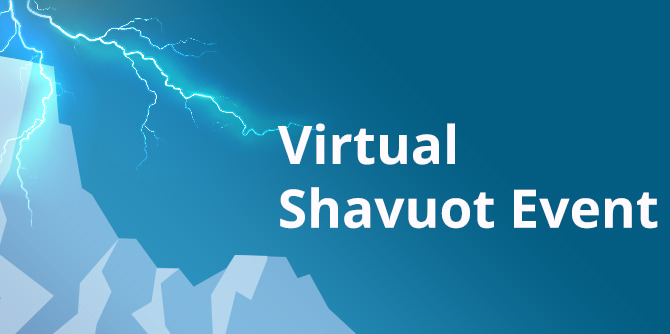“I have no existence without the lightning and thunder I heard at Sinai” — Zelda

As part of the series “A Time of Crisis, A Time for Leadership,”
Malka Puterkovsky, halakhic scholar and visiting faculty member of the Mandel Leadership Institute, had an online conversation on the nature of halakhic rulings with
Rabbi David Menachem, a composer of piyyutim, preacher, commentator, halakhic scholar, and halakhic decisor (posek). Held ahead of Shavuot, the festival marking the giving of the Torah, the event focused on the ways in which Orthodox halakhic decisors deal with issues that typify periods of crisis, such as caring for the elderly, the sick, and those in need of supervision.
Their discussion also examined the following questions: What is expected from leaders who act in accordance with Orthodox halakha during challenging times? Who decides what constitutes binding halakha in the circumstances we face? And what is the process by which halakha is decided so as to reflect changes in the real world?
As a case study, the two scholars analyzed the halakhic ruling issued by a group of municipal and neighborhood rabbis who belong to the association of Maghreb rabbis in Israel, which permitted the use of the Zoom video conferencing platform on the night of the Passover Seder. This dispensation was given in response to a question from someone who wanted to prevent elderly members of his family from spending the Seder night alone due to the strict social distancing restrictions imposed by the Israeli Ministry of Health.
“How can it be that a certain halakhic issue may be the subject of different, even contradictory, rulings?” Malka Puterkovsky asked Rabbi Menachem. “And what is your halakhic approach to situations in which human distress comes up against a halakhic prohibition?”
“A serious halakhic decisor does all he can in order to include the person who is asking the question in the halakhic deliberation. The great decisors excelled at this. They saw the question and the issues at hand, but at the center of their consideration, they also saw the individual asking the question and his personal distress,” answered Rabbi Menachem. “Tradition is more important than the written texts. We need to balance the teachings of the fathers with the teachings of the rabbis.”
As the conversation continued, the two discussed the pros and cons of this specific rabbinic ruling. One the one hand, there are concerns about a “slippery slope” – an extra-halakhic argument that holds that it may be legitimate to forbid practices that are actually permissible, out of fear that permitting a specific case will lead people to make allowances for themselves independently in other cases that they might see as similar when in fact the action would be clearly forbidden by Jewish law. On the other hand, there is the immense importance of the mental health of those who found themselves isolated throughout the coronavirus lockdown, and particularly on Seder night, as was noted by the rabbis who issued the ruling itself: “It is necessary to alleviate sadness among the elderly in order to motivate them to continue to fight for their lives and to prevent them from experiencing depression and mental weakness, feelings which could cause them to give up on life.”
The two participants expressed their approval of this halakhic ruling: “Halakhic leadership is measured in times of crisis by whether it can adapt and apply Jewish law to the specific circumstances being faced,” said Rabbi Menachem. Malka Puterkovsky added: “If we are constantly afraid of adapting Jewish law to current circumstances, we will become fossilized; halakha will cease developing, and thus will become disconnected (heaven forbid) from the needs of the times, something which the great halakhic decisors in every generation knew should never be allowed to happen.”
At the same time, the two also spoke of the importance of dispute in halakha: “At the end of the day, halakha, even Orthodox halakha, is a man-made system.… It is characterized by flexibility, creative thinking, and depth. But in order for disputes to be settled ‘for the sake of Heaven,’ they must include rational, pertinent, and respectful arguments," said Malka Puterkovsky. Rabbi Menachem concluded by quoting Rabbi Yitzchak Hutner: “When there is a situation of dispute, ‘these and those’ are the living words of God.”
About the participants
Rabbi David Menachem is a community rabbi, halakhic scholar, Biblical interpreter, cantor, singer, and composer of piyyutim, who is prominently involved in the development of Israeli culture.
Malka Puterkovsky is a halakhic scholar and educator who combines traditional Jewish sources in a variety of ways in order to provide responses to individual and public challenges in the State of Israel.
